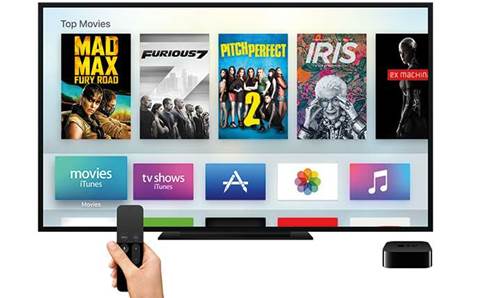Apple chief executive Tim Cook unveiled a new version of its Apple TV product with an app store and a voice-controlled remote control, part of a trio of announcements aimed at revamping its product line.
Cook described the new Apple TV, a product which the company long called a 'hobby', as the future of television, offering personalisation and ease of use. It starts at US$149.
The announcement came after Cook showed off a big new iPad aimed at business customers, which has an optional "Pencil" stylus and keyboard. He also began describing an updated pair of iPhones that feature a so-called '3D touch' interface and other upgrades.
Demonstrations of the new Apple TV showed tricks to make viewing easier: digital assistant Siri, which is behind the voice control, can rewind a video for 15 seconds and turn on subtitles, when a viewer asks something like "What did she say"?
"We've been working really hard, and really long," on TV, Cook said, emphasising the word 'long' in a nod to the time it has taken the company to produce an ambitious TV product.
Twitter users were generally impressed with Apple TV, with some people joking that they would have to buy a TV to use the Siri remote and app store.
“I’m all about this new #AppleTV. Shut up and take my money,” wrote Twitter user Ethan Anderton.
The new TV will run on an app store also will let developers create new software for Apple TV, including video games.
Apple collaborates with Hermes on Watch
Cook began the morning by talking up the Apple Watch, saying customer satisfaction for the new product was 97 percent. Apple is working with French luxury goods maker Hermes on a new watch collection, and Facebook Messenger is coming to the device, he added.
He then rolled out the "iPad Pro" with a 12.9 inch screen and said it had performance similar to a desktop computer. Apple showed off a "smart" keyboard and a stylus called "Pencil".
Apple said it had partnered with Cisco and IBM to help power the iPad pro, which it said is up to 1.8 times faster and has a 10-hour battery life. Apple announced partnerships with former rival Microsoft and Adobe, as well.
Many people on Twitter seemed unimpressed by the new iPad and lamented its large size, however, as well as the US$99 price of the Pencil. The new iPad will start at US$799.
The Apple event also featured updated versions of its iPhone, which drove nearly two-thirds of the company's US$49.6 billion in revenue in the most recent quarter.
But a year after Apple rolled out iPhones with larger screens, touching off a frenzy of sales that saw revenue in the most recent quarter increase 32.5 percent from the same quarter a year ago, the latest upgrades may leave some investors and consumers underwhelmed.
"It's getting harder and harder for Apple to compete against itself," said analyst Bob O'Donnell of TECHnalysis Research. Apple shares are up more than 14 percent over the last year, although they are down nearly 12 percent in the last three months.
Fortunately for Apple, most consumers buy smartphones under a two-year upgrade cycle, meaning the company will still likely scoop up a lot of sales, said analyst Patrick Moorhead of Moor Insights & Strategy.
"The key point of reference is not how the new phone compares to the iPhone 6, it's how it compares to the iPhone 5s," he said.
Apple shares reversed early gains and were down about 1 percent at US$111.18 midway through the presentation, replicating a pattern in which investors tend to "sell on the news" during Apple product events.
"People love to hate Apple announcements because the expectations are so high and they can never clear that bar," said Kevin Landis, portfolio manager of the US$111 million Firsthand Technology Opportunities fund, which has Apple as its second-largest position.
(Additional reporting by Lisa Richwine, Yasmeen Abutaleb, David Randall and Peter Henderson; Editing by Christian Plumb and Stephen R. Trousdale)





.jpg&h=142&w=230&c=1&s=1)


.png&h=142&w=230&c=1&s=1)
_(27).jpg&h=142&w=230&c=1&s=1)




.jpg&w=100&c=1&s=0)











